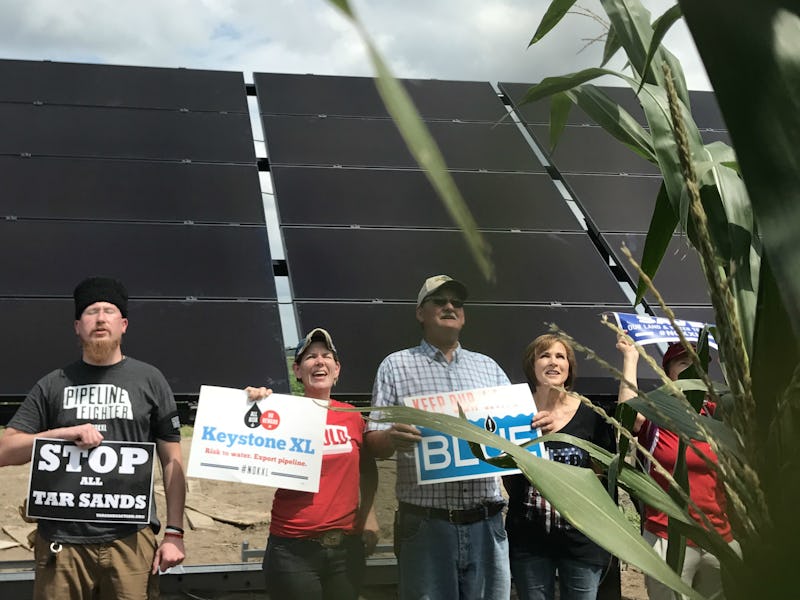The Innocuous Solar Panel, Used as a Protest Tool in Nebraska
They are refusing to let the pipeline go through their back yard.

Approved in the final months of the administration of George W. Bush, the Keystone XL pipeline will, when completed, pump oil from Canada to refineries in the United States. While the pipeline’s maker, TransCanada, the energy company based in Calgary, Alberta, is reportedly still looking for customers to use the pipeline, activists along the controversial project are defiantly creating their own energy, not from fossil fuels, but from solar panels.
The “Solar XL” project uses solar panels instead in place of the traditional human chain of civil disobedience.uses solar panels instead in place of the traditional human chain of civil disobedience.
“We’re building solar panels directly in the path of the proposed Keystone XL pipeline,” organizers say, and this week, shared photos of some of the first such protest panels, installed on Saturday. Activist groups Bold Nebraska and the Indigenous Environmental Network are behind the project and are raising $50,000 to build the first solar panels on farmland that land owners in Nebraska have refused to give up to TransCanada for the pipeline. The solar panels will be connected to Nebraska’s power grid.
With mere weeks to go before the Nebraska Public Service Commission holds its final public hearings about whether or not to approve the fourth-and-final segment of Keystone XL, anti-pipeline activism is taking a ferocious last stand, and a taste of the protest energies has been documented in a series of touching photos released on Monday.
This first segment of panels were installed property of Jim and Chris Carlson by Silver Creek, Nebraska. The Carlsons turned down a $307,000 offer from TransCanada — the company constructing the pipeline — to run parts of it through their backyard. That doesn’t necessarily mean that their farm is safe, though: The legal concept of “eminent domain” can and has been used to force landowners to forfeit parts of their property to the Keystone XL pipeline, since the oil will have a “public use.”
The Carlsons have now taken an even bigger stand by volunteering to host the first segment of the “Solar XL” panels. Jim Knopik, head of the family-owned solar panel installation company North Star Solar Bears, ran the installation activities on Saturday.
Here’s Knopik with Jim Carlson and Jane Kleeb, the founder of “Bold Nebraska.”
Jim Knopik (left) of North Star Solar Bears, farmer Jim Carlson, and 'Bold Nebraska' founder Jane Kleeb.
Here’s one of the frames of the panels — which were all built in the United States — going up.
North Star Solar Bears installation crew raises the frame for the solar installation built in the path of Keystone XL.
Volunteers who installed the massive solar panel above them:
Volunteers, North Star Solar Bears installation crew, and Bold Nebraska install solar panels in the path of the Keystone XL pipeline on Jim and Chris Carlson's farm near Silver Creek, Nebraska on July 29, 2017.
Another shot of the crew next to a completed panel:
Volunteers, North Star Solar Bears installation crew, and Bold Nebraska install solar panels in the path of the Keystone XL pipeline on Jim and Chris Carlson's farm near Silver Creek, Nebraska on July 29, 2017.
“I am vehemently opposed to the Keystone XL pipeline mainly because of the properties of the contents of the tar sands oil it will carry,” said Jim Carlson on Monday. “This is not your mother’s crude oil, it is the devil’s, and it can kill. We must be focused on clean, renewable energy and America can get along just fine without this foul concoction they call bitumen that TransCanada wants to pipe across our precious soil and water.”
Activist Joye Braun said that the solar panel-based protest doesn’t merely draw attention to stopping the Keystone XL pipeline, but it also shows “that there are alternatives to the fossil fuel industry that do not put communities at risk.”
The Nebraska Public Service Commission will hold public hearings between August 7-11 and then make its final decision.